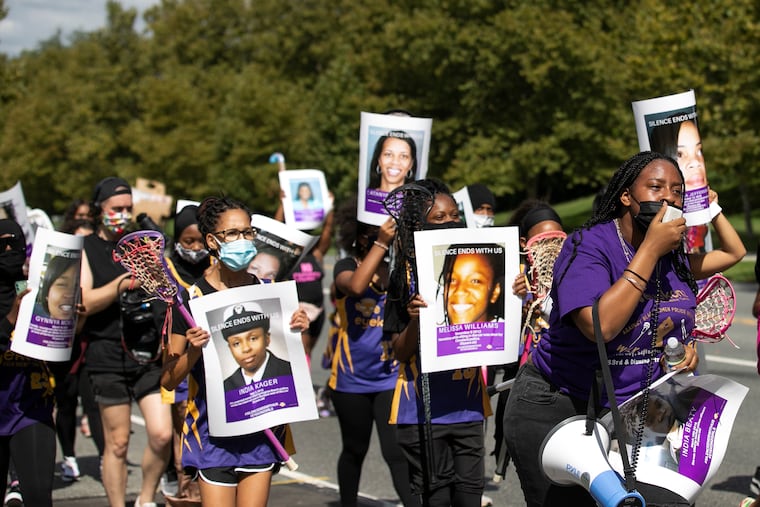‘I’m hurt. We’re hurting.’ Black girls with Eyekonz Field Hockey and Lacrosse march against police brutality
About 75 girls and young women participated in the Philadelphia sports league’s inaugural “Walk for Justice," remembering victims and proposing police reforms. Help came from former Gov. Ed Rendell.

One by one, Kai Coleman spoke the names and ages of 39 Black women and girls killed by police or who died while in custody nationwide in the past four decades. When Coleman got to the name of 16-year-old victim Gynnya McMillen, who took her final breaths in a Kentucky juvenile facility, she paused.
“Only 16. I’m 16,” Coleman said, her voice rising over the crowd gathered at the foot of the Philadelphia Museum of Art. “That’s not OK. That’s not OK. ... I’m hurt. We’re hurting."
Tears in her eyes, Coleman handed off the microphone and embraced coach and mentor Jazmine A. Smith, founder of Eyekonz Field Hockey and Lacrosse. Saturday marked the sports league’s inaugural “Walk for Justice," and the West Philadelphia teen was one of roughly 75 people, mostly young Black girls and teammates, who marched from a park in Strawberry Mansion to the Art Museum steps.
Escorted by police, they walked down 33rd Street chanting, “The silence ends with us.” Residents came out on their porches to cheer them on. Car horns were honked in support. Donning Eyekonz’s purple-and-gold sports jerseys, the young marchers each held a lacrosse or field hockey stick in one hand and a poster-size photograph of a female victim of police brutality in the other.
The youngest among them was 6-year-old Katelyn Britt. The North Philadelphia girl, wearing shiny pink sneakers and a colorful bow in her hair, walked the two miles carrying a field hockey stick more than half her size and a poster of 30-year-old Redel Jones, fatally shot by a Los Angeles police officer in 2005.
During the rally, Britt’s older sister, Anai’ya Baskerville, 16, who plays lacrosse, read a poem she wrote that began, “Dear America, I CAN’T BREATHE!!! I am being suffocated by your oppression, culture appropriation, and ignorance. I am expected to live the American way, but I can’t be too ghetto. I can’t be too proud. I can’t live. ...”
Coleman, who plays lacrosse for Eyekonz, later said her tears grew out of anger and frustration. “Honestly, I’m tired. I’m exhausted. We should not have to march every single day because y’all don’t understand the decency of the human life,” she said.
But for Coleman and her peers, the Eyekonz event was not only about calling attention to police brutality against women of color. It was about having their voices heard and feeling empowered. The girls spent the summer crafting police reforms that they plan to present to local and federal lawmakers.
Smith, 43, started Eyekonz in 2002 with a mission to foster “self-love” and create opportunities for inner-city Black and Latino girls and boys, ages 5 to 18, through lacrosse and field hockey. With 526 children, the league has started teams at 14 schools across the Philadelphia region, along with seven club teams, Smith said.
After Minneapolis police knelt on George Floyd’s neck and killed him, Smith said many of the girls “were up in arms and they wanted to march,” but she challenged them to brainstorm ideas for ending police violence. They enlisted help from former Pennsylvania Gov. Ed Rendell to put their proposals on paper, she said.
Erin Mobley, 15, a 10th grader at Central High School, is a founding member of the Eyekonz Legal Coalition.
“We want to spread awareness to everybody that Black women are not getting the justice that they deserve and we feel that we’re at the bottom of the pyramid for justice,” Mobley said.
Coalition members have come up with five police reforms, ranging from increased anti-bias training for officers to a national mandate for body cameras.
Sophia Poole, 14, who lives in Germantown and plays both lacrosse and field hockey, said she has family members who are police officers and she recognizes that most are good people. The girls began to gather for the event near the corner of 33rd and Diamond Streets at about 9 a.m. By 10 a.m., more than a dozen officers had arrived in two police vans and six police cruisers. Poole glanced at the large police presence.
“I think that it’s good that they’re here to protect us. I think that it’s good that they’re here to support us, and I hope this march gives everybody some type of understanding that African American women are put at the bottom and that we are not really thought of and it’s a cry for help,” Poole said. “I just don’t see how we live in a world where we think everything is OK, but we actually live in a dystopia. I don’t see how everybody is OK with that.”
Speaker Ericka Gaines, 50, a single mother who raised four children and one of the Eyekonz leaders, said Black women suffer devastating disparities in health care, education, housing, and economic opportunity. “The police brutality is just one aspect of the way that women are marginalized, and even more so, Black women, and I’m so encouraged that Eyekonz is here. ... When I see these beautiful, young, Black queens behind me, I’m hopeful."
Lt. Minerva Cruz, a member of the department’s Civil Affairs Unit who attended the event, said she was heartened to see young women of color come together.
“They’re all here trying to show sisterhood and how sisters work together and how they can help the community and give a voice to important things that they believe in,” she said. “I think it’s wonderful.”